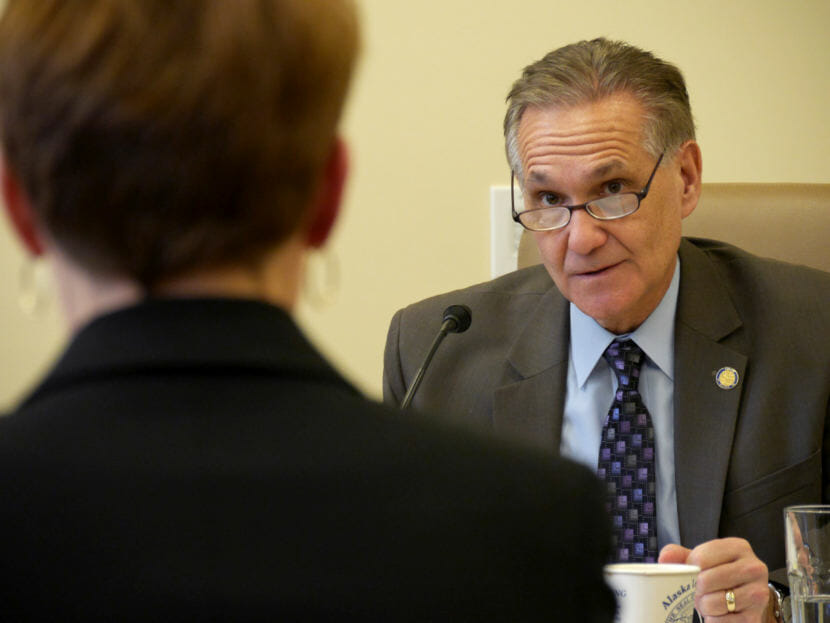
Lt. Gov. Kevin Meyer has announced a plan to mail absentee ballot applications to Alaskans ages 65 and older. Some lawmakers and voting advocates are concerned that this would create unequal access to those who don’t automatically get ballot applications.
During an online town hall on Thursday, Meyer described why the Division of Elections will be mailing absentee ballot applications to all registered voters who are 65 and older: They have a greater risk of getting COVID-19.
“That is a very vulnerable group,” said Meyer, a Republican.
Meyer said the state Division of Elections is hearing it directly from seniors who have worked at the polls in the past.
“A lot of these people right now are reluctant to commit, because they’re worried about the virus, or the pandemic,” he said. “And they should be, and if they’re not comfortable, we don’t want them to come out.”
Meyer said the state is encouraging voters to request absentee ballots or to vote early to reduce the lines on election day.
Some think the state should go further, and send the applications to all registered voters.
Kendra Kloster works to increase voting as the executive director of Native Peoples Action Community Fund. She praised Meyer’s approach for seniors and said everyone would benefit by also receiving applications.
“I think that this would be a first step, but I definitely don’t think that it goes far enough to ensure that we’re protecting all people of Alaska,” she said.
Kloster said every registered voter should receive a ballot application to increase safety and to treat all Alaskans equally. And she noted that the state has faced a challenge in identifying poll workers.
“They need to be taking additional steps to make sure that every person has the same access to voting, no matter their age,” she said.
Kloster is particularly concerned that not sending applications to all rural voters will be an obstacle to some with limited internet access.
And she said making it easier for younger voters to apply for absentee ballots will make the voting process safer for everyone, including those with pre-existing health conditions and older voters who live with younger voters.
Lawmakers also are raising concerns.
Anchorage Democratic Rep. Matt Claman sent a letter to Meyer and Gail Fenumiai, the director of the state Division of Elections, raising voting rights and constitutional concerns.
In the letter, first reported by the Anchorage Daily News, Claman said automatically sending applications to only seniors will favor white voters and disadvantage minority voters. That’s because 33 percent of Alaskans who are younger than 65 are people of color. But, that drops to 23 percent of those 65 and older.
A spokesperson for Meyer said elections officials are evaluating and developing a response to Claman’s letter.
Sitka Democratic Rep. Jonathan Kreiss-Tomkins is also concerned. He said he doesn’t understand why the state isn’t making it easier for everyone.
“Why should we stop at 65 if we can potentially help voters of all ages and backgrounds not have to vote in person and therefore increase the risk of transmission of the coronavirus?” Kreiss-Tomkins said.
Kreiss-Tomkins has asked the Legislature’s nonpartisan legal advisers to examine whether it is constitutional to mail the applications automatically to just one class of voters. And he said that the state plan shows it’s doable to send them to a large number of voters.
Meyer has raised concerns that mailing a large number of ballots would lead to some ballots being left unattended and increase the chance of voter fraud.
Both Kloster and Kreiss-Tomkins said that’s a separate issue from mailing the applications for ballots, and not the ballots themselves.
The applications require a personal identifier like a driver’s license number or the last four digits of a Social Security number. And they require a handwritten signature.
To mail an actual absentee ballot, the voter must sign the ballot in the presence of an adult witness.
Along with their demographics, older voters nationally also differ from younger voters in political preferences. In 2016, Donald Trump nationally won the vote of those 65 and older by 7 points, according to exit polls. But these polls found he lost the vote of those younger than 65 by roughly 4 points.
Recent polls have found an even wider gap in Americans’ preference for congressional candidates. Republican candidates led among those older than 65 by 7 and 12 percent in two recent polls, while Democratic candidates led among those younger than 65 by at least 10 points.